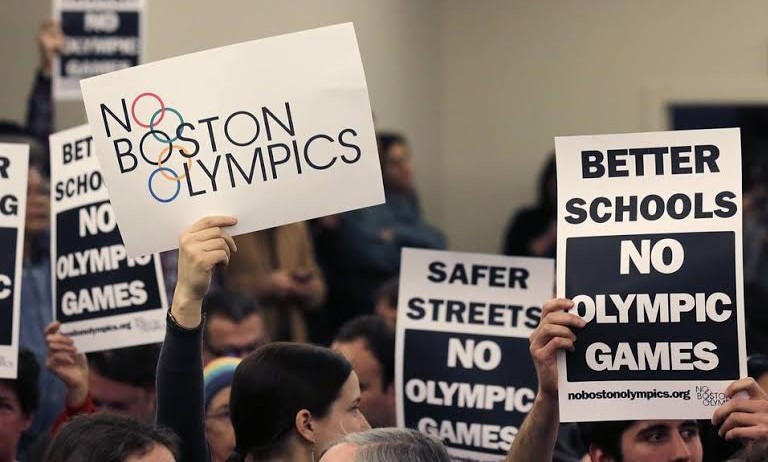Less than seven months after Boston was chosen as the American bid for the 2024 Olympics, that choice has been reversed. Mayor Marty Walsh formally announced the decision on Monday, which was ultimately driven by the people of Boston and supported by Governor Charlie Baker. Walsh noted that if Boston were to play host in 2024, its citizens could experience dramatic tax increases in the years leading up to the Olympics in order to pay for the construction of extensive infrastructure.
Ever since Boston earned the bid in January, a majority of its citizens had voiced clear opposition to the prospect of hosting. The fact that the United States Olympic Committee (USOC) chose Boston in the first place highlights the clear disconnect in the selection process between the committee and the city’s citizens. The campaign for a bid was headed by Suffolk, a private construction company, and advised by sports franchise owners, senators, and university heads from the Greater Boston area. Boston’s citizens were seldom consulted on the city’s path to receiving the American bid, which stems from not only the inherent separation in the selection system, but also in the short time frame in question. Boston announced that it would be competing for selection on December 1, 2014, only a month and a few days before the bid selection was made—little time for Boston’s citizens to weigh in on the prospect of the world’s greatest sporting spectacle taking place in their hometown.
The USOC and higher Olympic powers are not guilty of FIFA-level corruption and consequently irrational venues (i.e. Qatar). However, Olympic bureaucracy has failed to consider infrastructural logistics as recently as Sochi and Beijing, where venues were left abandoned merely months after those Olympic games. Boston would only suffer from rotting stadiums sucking money out of the city’s pockets long after 2024.
Though an alternative American city has not been officially chosen to replace Boston on the short list, Los Angeles has been cited as a frontrunner. The two-time previous host nearly won the bid in January and seems to have many of the credentials that Boston does not. Apart from being a significantly larger city than Boston, Los Angeles has a greater number of professional sports teams, which in turn means more Olympic-worthy stadiums and less reliance on the taxpayers for new infrastructure. While Boston has been host to some of the greatest professional sports teams and stadiums in the past fifteen years, the likes of Fenway Park (home of the Red Sox) and Gillette Stadium (Patriots) are the only two outdoor arenas in the area with a capacity of over 35,000. Los Angeles, on the other hand, has over five such stadiums, with many more options for an Olympic Stadium to host the opening ceremonies as well. This leaves many wondering why Los Angeles was not chosen in the first place.
Ultimately, hosting the Olympics was never a necessary endeavor for Boston to pursue. The City of Champions should be satisfied with its nine professional sports championships in the past fifteen years. Monday’s announcement was, if anything, a relief for the citizens of Boston, who don’t need a worldwide spectacle like the Games or the economic fireworks associated with them.

